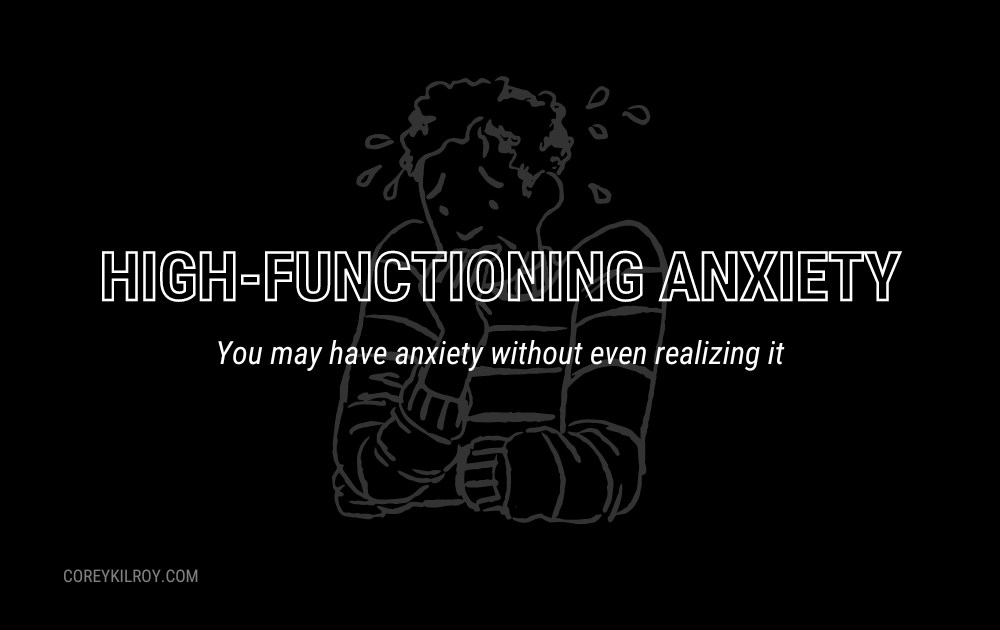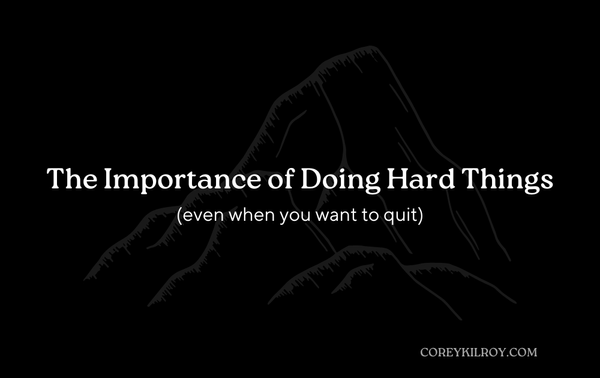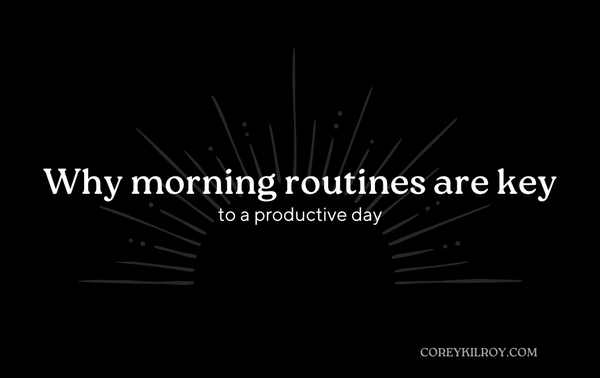High-Functioning Anxiety

An estimated 31.1% of U.S. adults experience an anxiety disorder at some point in their lives.
That’s a truly significant amount of individuals who are dealing with some sort of anxiety in their lifetime, making anxiety the most prevalent condition in the country.
Within this wide spectrum of people, there’s a subset who are referred to as people with high-functioning anxiety.
Despite not being a professional diagnosis, high-functioning anxiety refers to the type of people outwardly perceived as highly successful in their everyday lives and well-equipped to manage their tasks and responsibilities.
These people can be excellent at work, social life, and day-to-day activities, but on the inside, mentally, they’re constantly stressed, worried, and anxious.
Signs & symptoms of high-functioning anxiety
It’s always important to note that to receive a diagnosis for an anxiety disorder, a doctor may conduct a physical examination or lab tests to rule out other conditions that cause symptoms that may be confused with anxiety, such as heart disease or high blood pressure.
If no underlying health concerns are found, a doctor may then conduct an interview or refer an individual to a mental health professional for psychological evaluation, known as the Diagnostic and Statistical Manual of Mental Disorders (DSM-5-TR).
During this evaluation, a mental health care provider may diagnose you with an anxiety disorder based on criteria from the DSM-5, including:
- Excessive anxiety and worry for more days than not about events or activities such as work or school performance for at least six months.
- Difficulty controlling feelings of worry, with symptoms such as increased heart rate, fatigue, sleep disturbances, trembling or shaking, nausea, dizziness, muscle tension or aches, restlessness, difficulty concentrating, or irritability.
- Symptoms cause significant distress or impairment in social settings, at work, or in other areas of functioning.
- Recurrent panic attacks followed by at least one month of fear of having another panic attack, worry about the implications or consequences of panic attacks (such as having a heart attack or loss of control), or changes in behaviors related to panic attacks.
- Fear of social or performance situations during which an individual is exposed to new people or to possible scrutiny from others.
- Exposure to feared situations leads to a panic attack.
- An individual avoids social situations or endures them with distress.
- Symptoms cannot be attributed to a medication or substance.
In short, people with high-functioning anxiety tend to overfunction.
They may work extra hours, volunteer for extra assignments or try to perfectly do all tasks.
They look for clues on how society defines success and pressure themselves to achieve or surpass these often unrealistic expectations. This intense push can lead to burnout because of their constant drive to overachieve and their fear of failure.
I deal with this… a lot.
People with high-functioning anxiety also may put their personal relationships at risk because they spend so much time focusing on other areas in their lives.
Criticism, even constructive feedback, can be particularly difficult for people with high-functioning anxiety. They may overreact to any criticism and harshly internalize it.
They may neglect self-care like sleep, exercise, and nutrition, and face physical health problems associated with chronic stress.
People with high-functioning anxiety ultimately experience the world around them with a unique set of characteristics and symptoms, which usually presents as a complicated combination of psychological symptoms, personality traits, and physical manifestations.
Physical symptoms
Here are the relevant physical symptoms that are experienced:
- Restlessness and unease - Constantly feeling on edge, leading to an increased heart rate and high blood pressure.
- Muscle tension and fatigue - Long-term discomfort, which will lead to headaches and exhaustion.
- Gastrointestinal issues - Digestive and stomach issues brought on by persistent stress.
Personality traits
These are the predominant personality traits that a person will experience:
- Perfectionism - The never-ending pursuit of flawlessness, motivated by a harsh inner critic.
- Overachievement - Constantly trying to exceed standards, which can often be driven by a fear of not being good enough.
- Excessive worry - Excessive concern about future uncertainties as well as an inclination to dwell on past behavior.
- Fear of failure - A general dread of making mistakes or failing to fulfill expectations, causing people to avoid taking on new challenges.
Psychological symptoms
Here are the key psychological symptoms that define high-functioning anxiety
- Racing thoughts - There will be a relentless stream of negative thoughts that can overwhelm the mind, leading to an inability to focus on tasks.
- Mental exhaustion - The mental strain experienced by constant worry, overthinking, and predicting the worst can lead to a feeling of exhaustion that no amount of rest or sleep will resolve.
- Indecisiveness - When you are constantly living in fear of bad things happening, you can find yourself agonizing over even the smallest daily decisions that you have to make.
Because people with high-functioning anxiety may be very good at controlling or hiding their symptoms, it’s important to be honest with a mental health care provider about symptoms and concerns.
What causes high-functioning anxiety?
Researchers typically believe that high-functioning anxiety is the result of a mix of interactions between genes, brain chemistry, personality, and environmental factors.
Some specific causes may include:
- Family history of anxiety disorders
- Exposure to negative or stressful life events
- Certain physical health conditions like thyroid issues
- Substance or alcohol abuse
- Shyness or nervousness traits from childhood
People who may be especially susceptible to high-functioning anxiety may include those with very stressful professions, such as surgeons who take on a lot of cases, lawyers during trials, or first responders.
Brain chemistry is another factor.
Neurotransmitter imbalances can affect a person's mood and stress levels during their everyday lives.
Additionally, individuals who may have personality characteristics like perfectionism, fear of failure, or a high level of control might be predisposed to high-functioning anxiety.
Besides this, very stressful or traumatic life events can trigger or exacerbate the symptoms of anxiety as well.
So… a lot can contribute to this disorder.
High-functioning anxiety vs other anxiety disorders
Here are some of the most common types of anxiety disorders, according to the National Alliance of Mental Health:
- Generalized Anxiety Disorder (GAD): GAD symptoms can include constant worrying about everyday life. The worry isn’t linked to a certain event but rather tends to be more chronic. Someone with GAD may have difficulty finishing tasks or struggle to concentrate, and their worrying tends to exhaust them.
- Panic disorders: These disorders often consist of panic attacks and the sudden onset of terror without any forewarning. Sometimes, panic attacks can cause chest pain, heart palpitations, shortness of breath, and dizziness, leading some to think they’re experiencing a heart attack.
- Social anxiety disorder: This disorder takes place in social settings and causes anxiety when having to contribute to discussions or partake in conversations. It’s driven by the worry of saying the wrong thing, not knowing what to say, or being humiliated.
- Phobias: Phobias are considered an anxiety disorder because someone with a phobia tends to have strong reactions of fear or discomfort. Phobias can include places, objects, or events. Depending on what it is and how strong of a reaction it causes, many avoid any potential triggers to avoid having a panic attack.
How to treat high-functioning anxiety
When it comes to tackling a disorder such as high-functioning anxiety, it takes a multifaceted approach to treating it.
Option 1 - Talk Therapy
Talk therapy can be a very effective way to mitigate symptoms of high-functioning anxiety.
Speaking to a therapist, a counselor, or even a close friend can help you understand your anxiety and teach you techniques to better manage your symptoms.
One technique that may be utilized during these sessions is Cognitive Behavioral Therapy (CBT), which is defined as a common form of psychological treatment used to change thinking patterns with the goal of better understanding one’s behavior and recognizing one’s distortions.
CBT treatment usually involves trying to change thinking patterns, including:
- Learning to recognize one’s distortions in thinking that are creating problems, and then reevaluating them in light of reality.
- Gaining a better understanding of the behavior and motivation of others.
- Using problem-solving skills to cope with difficult situations.
- Learning to develop a greater sense of confidence in one’s own abilities.
CBT treatment also usually involves efforts to change behavioral patterns. These might include:
- Facing one’s fears instead of avoiding them.
- Using role-playing to prepare for potentially problematic interactions with others.
- Learning to calm one’s mind and relax one’s body.
CBT ultimately works by helping people learn to reframe their thoughts about life and change behaviors that may feed their anxiety.
Instead of being self-critical and looking for what could go wrong, a person with high-functioning anxiety is taught to manage their thoughts, seek solutions, and guide themselves through anxious feelings.
Like I always say, focus on the controllables.
Instead of being afraid of your anxious feelings, with CBT, you may be taught to embrace it and say something like, "I have anxiety, and that's okay. My anxiety doesn't make me a bad person. It's just how my body and mind react to situations, and I can deal with it."
Option 2 - Balance Life.
Each person has different needs and energy levels in life.
One person may thrive in a busy, “go-go-go”, environment, while another person may need to prioritize times throughout the day to decompress.
Your needs for sleep, nutrition, exercise, self-care, and work-life balance will differ from others. You will know you have found the proper flow in life when you feel at peace with yourself about the amount of busyness versus rest and work versus play.
Option 3 - Practice Mindfulness.
This is the practice of being in the present moment and enjoying what life presents to you.
Concentrating on one thing or moment, like your breathing, can help you stay calm and reduce the amount of anxiety you may be experiencing.
I write all about mindfulness and being in the present moment here if you wanna check it out:

Option 4 - Breathing techniques.
Deep breathing exercises, like diaphragmatic breathing, for example, will cause the body to relax. This is a simple method that helps lower heart rate and eliminate the feeling of stress in the body.
I go into detail on how to practice the box breathing technique here.
You may also be so inclined to try meditation, which is a well-known technique that uses breath and mindfulness to calm the body.
Here are some tips for getting started:
→ Find a comfortable place to sit or lie down. You can close your eyes, but that’s optional – some people even find it better to keep their eyes open and focus on something in the room (maybe a speck on the wall, or an object).
→ Take a deep breath in and exhale slowly. Focus on your breath – picturing the air flowing in and out of your nose – or on the physical sensations in your body.
→ Bring your mind back to the present moment by focusing on an object in your current environment or thinking about something specific that’s happening (i.e. the drive to work, or walking your dog). If these strategies aren’t helpful to you, try journaling, mindfulness apps, retreats, or whatever works for you!
Option 5 - Medication.
Medications can help some people with high-functioning anxiety but should be a last resort and only used in conjunction with other coping strategies, additionally, while under the care of a health care professional.
Common prescription medications include serotonin reuptake inhibitors (SSRIs), serotonin-norepinephrine reuptake inhibitors (SNRIs), or tricyclic antidepressants.
Other medications like benzodiazepines, buspirone, and beta-blockers can also be used to treat anxiety as well.
In the end…
While high-functioning anxiety may not be an official diagnosis in the healthcare world, it represents a significant subset of people who experience anxiety symptoms while maintaining a high level of functionality.
These people face internal struggles like persistent self-doubt, fear of failure, and a constant drive for perfection and pleasing others, which profoundly affect their daily lives.
When high-functioning anxiety starts causing significant problems in your daily life or affecting your relationships and career, it’s always advisable to consider consulting a mental health professional.
Be well and Keep Pluggin.
-C.




